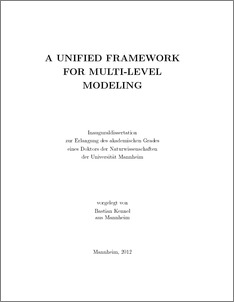|
A Unified Framework for Multi-Level Modeling
Kennel, Bastian
![[img]](https://madoc.bib.uni-mannheim.de/31906/1.hassmallThumbnailVersion/dissertationBastianKennel20120704.pdf)  Vorschau |
|
PDF
dissertationBastianKennel20120704.pdf
- Veröffentlichte Version
Download (2MB)
|
|
URL:
|
https://ub-madoc.bib.uni-mannheim.de/31906
|
|
URN:
|
urn:nbn:de:bsz:180-madoc-319067
|
|
Dokumenttyp:
|
Dissertation
|
|
Erscheinungsjahr:
|
2012
|
|
Ort der Veröffentlichung:
|
Mannheim
|
|
Verlag:
|
Universität Mannheim
|
|
Hochschule:
|
Universität Mannheim
|
|
Gutachter:
|
Atkinson, Colin
|
|
Datum der mündl. Prüfung:
|
26 Juni 2012
|
|
Sprache der Veröffentlichung:
|
Englisch
|
|
Einrichtung:
|
Fakultät für Wirtschaftsinformatik und Wirtschaftsmathematik > Software Engineering (Atkinson 2003-)
|
|
Fachgebiet:
|
004 Informatik
|
|
Normierte Schlagwörter (SWD):
|
Modellierung , Ontologie
|
|
Freie Schlagwörter (Englisch):
|
Modeling , Multi-Level Modeling , Ontology , Classification
|
|
Abstract:
|
With the growing importance of modeling in software engineering and knowledge engineering, and the accelerating convergence of these two disciplines through the confluence of internet-based software applications, the need for a simple, unified information modeling framework fulfilling the use cases of both communities has increased significantly over recent years. These use cases include switching seamlessly between exploratory and constructive modes of modeling, representing all objects of relevance to a system using a precise engineering-oriented notation, and applying a wide range of automated checking and reasoning services to models to enhance their quality.
This thesis lays the foundation for such a framework by formalizing and extending the multi-level modeling paradigm developed by Atkinson & Kühne, building a practical prototype tool based on the widely-used Eclipse EMF toolkit. This paradigm represents the best foundation for such a framework because it can capture all objects of relevance to a system, at all levels of classification (e.g. instances, types, metatypes, metametatypes etc...), in a uniform and extensible way regardless of when and how they came into existence. Multi-level models can therefore accomodate the generation and use of information from the exploration and discovery phases of a project right through to the operation and run-time execution phases, seamlessly changing the way the information is interpreted and processed as needed.
The developed framework and tool (Multi-level modeling and ontology engineering Environment, Melanie) encompasses all the typical ingredients of a model-driven development environment: a (meta) model (the Pan Level Model, PLM), a concrete syntax (The Level-agnostic Modeling Language, LML) and a formal semantics based on set theory. In addition, the framework supports the full range of model querying, checking and evolution services supported by standard software engineering and knowledge engineering tools. This includes full support for the constructive generation of instances from types and the exploratory discovery of new information based on existing model content (e.g. subsumption). To demonstrate the practical usability of the technology, the approach is applied to two well known examples from the software engineering and knowledge engineering communities -- The Pizza ontology from the Protégé documentation and the Royal & Loyal example from the OCL documentation.
|
 | Dieser Eintrag ist Teil der Universitätsbibliographie. |
 | Das Dokument wird vom Publikationsserver der Universitätsbibliothek Mannheim bereitgestellt. |
 Suche Autoren in Suche Autoren in
Sie haben einen Fehler gefunden? Teilen Sie uns Ihren Korrekturwunsch bitte hier mit: E-Mail
Actions (login required)
 |
Eintrag anzeigen |
|
|
